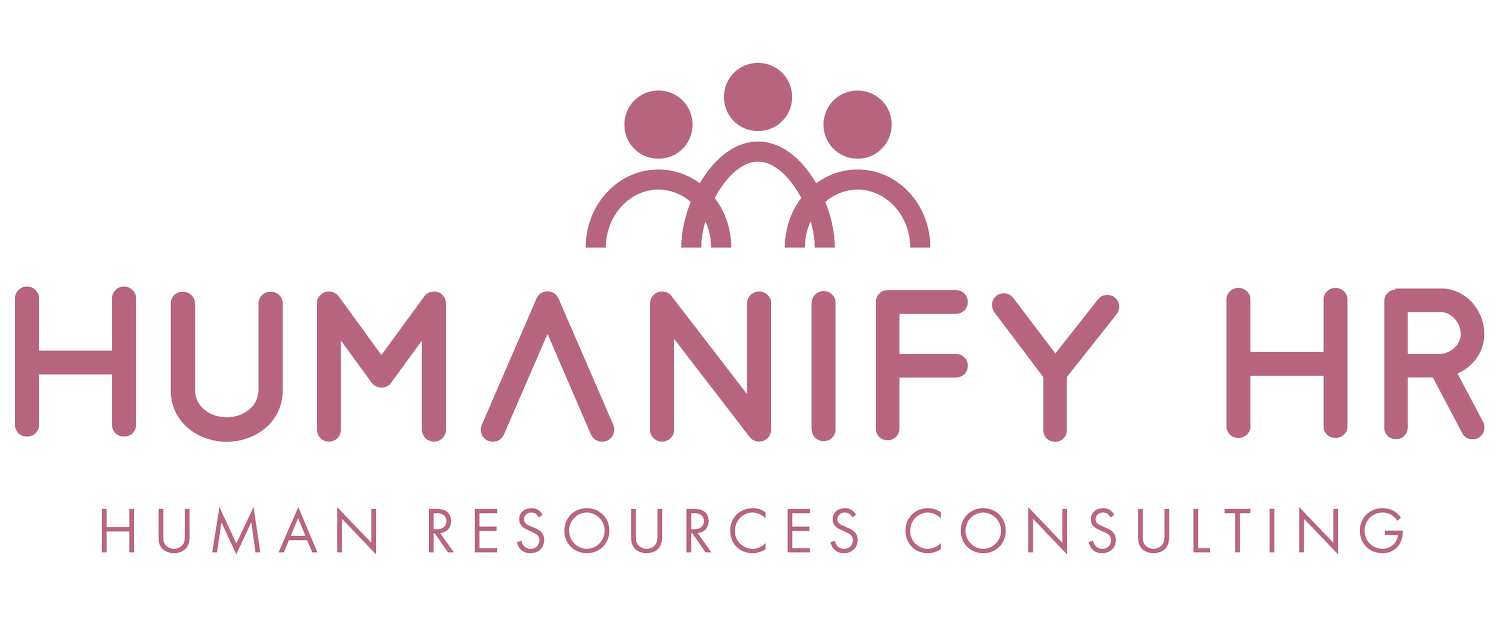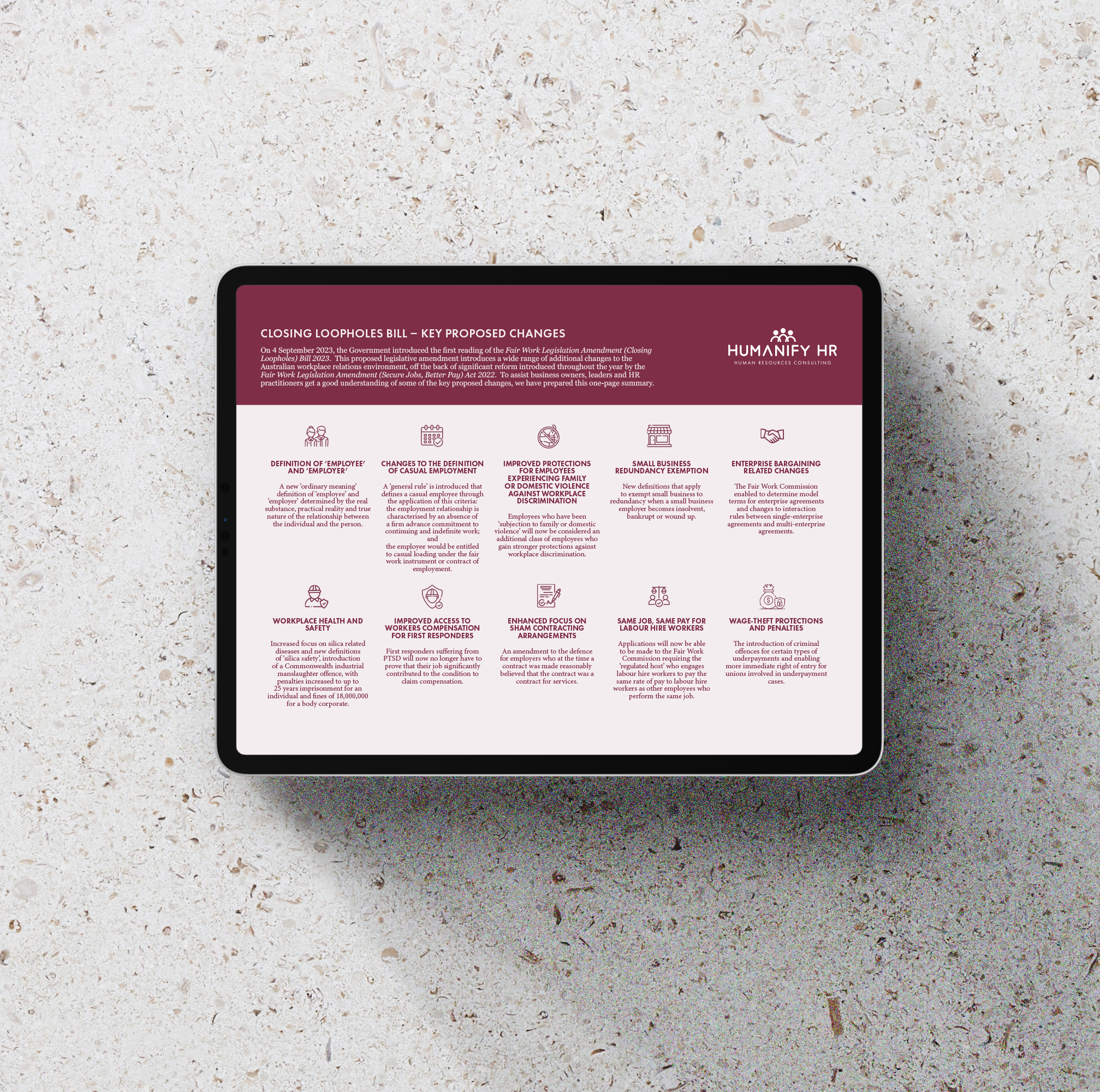FROM SECURE JOBS, BETTER PAY TO CLOSING LOOPHOLES – ARE YOU STAYING ‘IN THE LOOP’ WITH PROPOSED IR REFORMS?
The Australian workplace relations system has over the past year undergone significant reform through the implementation of the Fair Work Legislation Amendment (Secure Jobs, Better Pay) Act 2022. Just when many business leaders and owners thought they may be able to take a breath from the amount of IR reform, the Federal Government has recently announced a second phase of proposed change through the Fair Work Legislation Amendment (Closing Loopholes) Bill 2023 (the Bill).
So, in anticipation of some of the proposed changes included in the Bill potentially coming into effect – what could this mean for our workplaces?
Closing the “Loopholes”
The Bill proposes additional amendments to both the Fair Work Act 2009 (Cth) and Work Health and Safety Act 2011 (Cth). These amendments aim to close “loopholes” to protect Australian workers and put in place increased penalties to act as a deterrent, with the aim of ultimately creating safer workplaces.
Business groups, lawyers and members of Parliament have all expressed that the Bill has a much further reach than simply just closing “loopholes”, with a Senate inquiry established that will delay any potential implementation of the proposed changes until after February 2024.
High-level summary of key proposed changes
To assist business owners, leaders and HR practitioners get a good understanding of some of the key proposed changes included in the Bill, we have prepared this high-level summary.
Additionally, you can access our FREE Closing Loopholes download that can be used to help you brief your team, senior leaders or others in your organisation about these potential changes here.
Definition of ‘employee’ and ‘employer’ relationship
A new ‘ordinary meaning’ definition of ‘employee’ and ‘employer’ determined by the real substance, practical reality and true nature of the relationship between the individual and the person.
Changes to the definition of casual employment
A ‘general rule’ is introduced that defines a casual employee through the application of this criteria:
a. the employment relationship is characterised by an absence of a firm advance commitment to continuing and indefinite work; and
b. the employee would be entitled to casual loading under the fair work instrument or contract of employment.
Improved protections for employees experiencing family or domestic violence against workplace discrimination
Employees who have been ‘subjection to family or domestic violence’ will now be considered an additional class of employees who gain stronger protections against workplace discrimination.
Small business redundancy exemption
New definitions that apply to exempt small business to redundancy when a small business employer becomes insolvent, bankrupt or wound up.
Enterprise bargaining related changes
The Fair Work Commission enabled to determine model terms for enterprise agreements and changes to interaction rules between single-enterprise agreements and multi-enterprise agreements.
Workplace health and safety
Increased focus on silica related diseases and new definitions of ‘silica safety’, introduction of a Commonwealth industrial manslaughter offence, with penalties increased to up to 25 years imprisonment for an individual and fines of 18,000,000 for a body corporate.
Improved access to workers compensation for first responders
First responders suffering from PTSD will now no longer have to prove that their job significantly contributed to the condition to claim compensation.
Enhanced focus on sham contracting arrangements
An amendment to the defence for employers who at the time a contract was made reasonably believed that the contract was a contract for services.
Same job, same pay for labour hire workers
Applications will now be able to be made to the Fair Work Commission requiring the ‘regulated host’ who engages labour hire workers to pay the same rate of pay to labour hire workers as other employees who perform the same job.
Wage-theft protections and penalties
The introduction of criminal offences for certain types of underpayments and enabling more immediate right of entry for unions involved in underpayment cases.
Access a copy of our FREE download that provides a one-page visual summary of the proposed changes under the Bill here.
More information
You might find some of our other HR tools and resources available for download on our website of value, including:
· Calendar: Workplace Relations Changes Calendar 2023
· Checklist: Preparing for Enterprise Bargaining
· Guide: Preparing for Enterprise Bargaining
· Guide: Establishing Effective HR Policy Frameworks (for APS agencies)
· Article: Understanding the role of the Employee Support Person
· Article: Understanding the Better Off Overall Test (BOOT)
· Article: What are great HR teams are focused on when it comes to workplace relations changes?
Work with us
Humanify HR Consulting is a purpose driven provider of workplace relations, leadership, culture, coaching and HR consulting services. Contact us at hello@humanifyhr.com.au to see how we can work together to help you thrive in a new world of work.
Important Disclaimer: The material contained in this article is provided as general information only. It is not, nor is intended to be legal advice. If you wish to take any action based on the content of this article we recommend that you seek professional advice.


